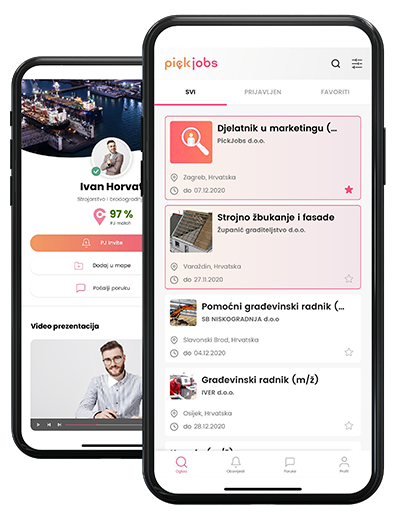A new job often brings with it a lot of stress. Will you live up to expectations? Will they see that I am not as capable as they thought? And so on with even worse options…
A new job often brings with it a lot of stress. Will you live up to expectations? Will they see that I am not as capable as they thought? And so on with even worse options... Everyone knows that feeling, especially women who normally have more problems with self-confidence at work. Even Sheryl Sandberg admitted that on her first day at work at Facebook, she felt like a fraud and thought to herself: "What am I doing here?".
Women in Adria offers advice on how to survive a new beginning. If you are looking for an online job, a seasonal job or a part-time job - contact PickJobs! Job ads are our specialty!
Establish a relationship with a superior
After the initial introduction, taking over the equipment...in the first few days, be sure to arrange a meeting with your superior. Although you probably already agreed on what your duties will be during the recruitment process, this meeting is the transfer of "words into actions". On it, you must agree on the activities on which you must concentrate and the deadlines.
If it's a company-wide initiative, ask your boss to introduce you and connect you with people from other departments. It is different when a higher-ranking person "starts" things than when someone who is still new and nobody knows him "hunts" people around the company.
That meeting will allow you to begin building a quality relationship with your superior that you must continue to invest in.
Don't rush to prove yourself
Yes, you are under pressure to prove yourself, but don't rush! Don't rush to inform your boss about anything that could be better, unless he asks you himself! Research shows that when an unknown person of a certain group prematurely makes suggestions "how things could be much better" they risk leaving a negative impression that will be difficult to repair. Try to understand why something works in a certain way, consult with a colleague (without "brainstorming") and wait until you create the whole picture.
It is especially important to understand the informal relationships in the company, which are often more important than the formal organizational structure and are often the answer to the question of why things are the way they are!
Create a balance between your private and work life
Every company has its own rhythm. Somewhere everyone stays overtime while the boss is in the office. Other companies give employees freedom. If you have reached a managerial position, then you will probably have the freedom to determine how your team will work.
As for your superiors, get them used to having more information than they need from you, so they won't think of asking how come you went home at 5. If you have to go home on time because of the children, do it yourself beginning. Anything you don't get to do or communicate, you get to later in the evening or early in the morning.
Build relationships with colleagues slowly
Your colleagues will probably give you a warm welcome and want to know everything about you. Refrain from oversharing private information. You want to be known from your professional side, not your private side. Also don't connect with everyone on Facebook right away. Of course, friendships at work are welcome, but let time take its course.
Your personality in the workplace, especially in the first few weeks after getting a new job, will most often determine your positioning. Of course, skills and knowledge are important, but in the beginning you have to be careful because it is shocking how easily you can make a bad or wrong first impression on new colleagues. So, how do you protect yourself in such a situation?
Meet expectations
When it is not clear what is expected of you, it is difficult to be successful in accomplishing work tasks. Instead of wandering between unknowns and ambiguities, ask for a meeting with your supervisor to clarify your job responsibilities and how your performance will be measured. You must ask your boss what your priorities are, task deadlines and how your performance will be evaluated.
Admit mistakes
We all make mistakes, and new employees more often than others. But don't make the mistake of thinking that no one will notice if you make a mistake and don't admit it. Instead, accept responsibility, learn, fix the fixable, and move on to new tasks.
Find out how you're doing
You don't have to wait six months or a year to find out if you're good at your job. Ask your boss for a meeting after a month of your arrival at the company and discuss what you have done successfully and what needs certain corrections.
Don't underestimate listening
It should be obvious, but many are ready in their impatience to show and prove their abilities and knowledge as quickly and as quickly as possible, so they speak without first listening. The result is the image of a "know-it-all without cover" who does not respect his colleagues. When you listen to what people have to say and what they want from you, you will earn the respect of your colleagues as someone who does not care about their own interests and as someone who is caring and considerate.
Online jobs, part-time jobs, student jobs, jobs in Germany, jobs in Croatia... You'll find all that and more on PickJobs!

 Croatia
Croatia Bosnia and Herzegovina
Bosnia and Herzegovina Serbia
Serbia Crna Gora
Crna Gora North Macedonia
North Macedonia Ukraine
Ukraine Albania
Albania Kosovo
Kosovo Austria
Austria Deutschland
Deutschland Switzerland
Switzerland









